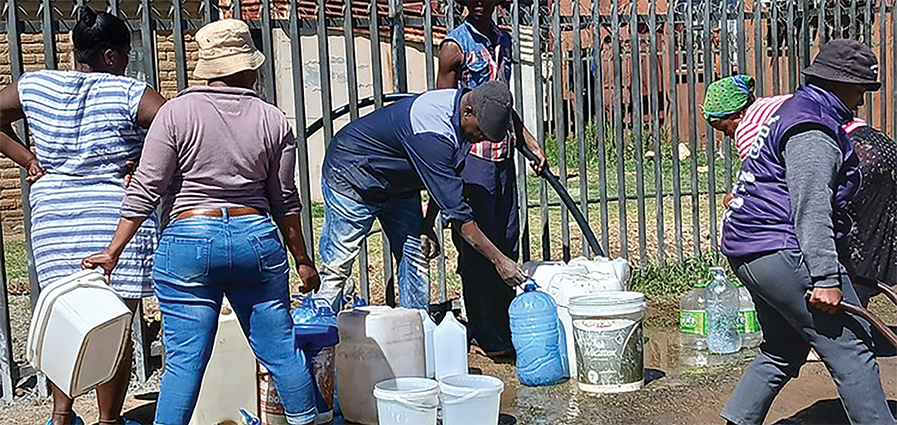DELIVERY: The taps in Kokosi, Fochville near Carletonville, have been dry for a month after Rand Water implemented water reduction measures against Merafong municipality for owing R1,4 billion…
By Silver Sibiya
A businessman from Kokosi, Fochville near Carletonville, has been dubbed a Good Samaritan after opening up his boreholes this week, as the community battles ongoing water outages.
Residents are blaming the Merafong Local Municipality for failing them because taps have been dry for over a month now.
When GroundUp visited the township, we noticed scores of people pushing wheelbarrows, some with 20-litre and 5-litre buckets filled with water from a newly built borehole. After inquiring, we were informed the borehole belonged to the businessman. Speaking to GroundUp on condition of anonymity, the businessman said he initially installed the borehole after the toilets in his tavern became unusable because there was no running water.
Residents say the trucks sent by the municipality don’t bring water every day. “When they do come, they run out before everyone gets water,” said resident Boitumelo Ntonyana. “Our toilets are unbearable.”
Matshidiso Moalosi, while filling containers, said: “We were never told about these cuts. The government does not care about us.” Resident Nainas Molepo fetches water from the borehole. The crisis in Kokosi and other surrounding areas is the result of Merafong’s R1.4-billion debt owed to Rand Water.
Since last year, Rand Water has been implementing water cuts as a debt collection mechanism for outstanding debts in several municipalities in Gauteng, Free State and Mpumalanga.
In court action to get Merafong to pay its outstanding debt, the Johannesburg High Court, in June, gave the municipality 30 days to submit its written representations to Rand Water. However, the municipality submitted its representations after the deadline.
The municipality’s submissions showed little to no intention that it would fulfill its obligations to Rand Water. This forced the utility to impose a 20% reduction in water supply, following a 20% cut earlier in 2025.
Municipal spokesperson Thabo Moloja explained that because the Kokosi community and other parts of Fochville are high-lying areas, the reduced water pressure simply cannot reach them.
He said at least 10 water trucks are sent out daily to communities, but hospitals, schools, and clinics are prioritised. “Additional support is being sought from the provincial government to supplement this fleet,” he said.
Rand Water spokesperson Makenosi Maroo defended the restrictions, saying municipalities must be held accountable. “It is important to emphasise that Rand Water will not risk its financial stability because of defaulting municipalities. Financial sustainability is essential to ensure we can continue supplying safe bulk water.”
According to the Department of Cooperative Governance and Traditional Affairs, Fochville is the oldest town in the region, and was declared a town in 1951. Fochville’s 2025 population is now estimated at 45 054. In 2001, the population of Fochville was 34 397. It is part of the Merafong City area, whose towns and areas within the Merafong City Local Municipality include Carletonville, Fochville, Khutsong, Kokosi, Wedela, Greenspark, and Welverdiend. Carletonville serves as the municipality’s administrative seat.
The town was established on two farms named Kraalkop and Leeuwspruit by the brothers Wulfsohn. The town was laid out during the First World War and officially proclaimed in 1920.
The brothers named the town after Marshal Ferdinand Foch who was a commander-in-chief of the Allied forces in France. – GroundUp, additional reporting by Weekly SA Mirror
Wits launches research centre to tackle SA’s water crisis
CHALLENGES: The country currently is in the midst of a systemic water crisis as a result of ageing infrastructure, poor governance and pollution from increasing population and demand…
By Lehlohonolo Lehana
The University of the Witwatersrand (Wits) launched its flagship water research centre in response to South Africa’s deepening water challenges.
Previously known as Centre in Water Research and Development (CIWaRD), the Wits:H2O is a working research grouping that brings together government, business, academia, and civil society to bring real-world solutions to water challenges in South Africa and across the African continent. The project was launched at the Wits Anglo American Digital Dome on Wednesday.
The centre is led by Professor Craig Sheridan, Claude Leon Foundation Chair in Water Research at Wits, supported by Professor Heidi Richards from the Wits School of Chemistry with the support of a large network of interdisciplinary researchers.
South Africa is currently in the midst of a systemic water crisis as a result of the convergence of causal factors such as ageing infrastructure, poor governance and pollution with an increasing population and demand. While access to water is a natural and basic human right, water crises like we see in South Africa today are human-made: human action can solve them, said Sheridan.
Projections suggest that by mid-century, water deficits could become the norm unless innovative, integrated solutions are urgently adopted. “We, as South Africans located within the African continent, are facing a water crisis. From regional ‘Day Zero’ type events to ongoing local water supply failures, every person is impacted. Wits:H2O represents our approach to thinking about water and engaging meaningfully with this crisis,” he said.
The centre collaborates with various other organisations locally and globally, including government business and civil society, to help safeguard the critical resource, with the purpose of combining the best thinking globally to consider the water challenges.
“South Africa is facing a significant skills gap in the water sector. Decades of underinvestment in training and capacity building have left us with too few qualified engineers, hydrologists, water managers and sanitation experts,” Sheridan continued.
The centre aims to conduct research and rebuild this essential skills base, while training and mentoring the next generation of professionals who will face the future of the increasing water challenges.
“Wits:H2O’s vision is to go beyond thinking about solutions, to think about how the solution impact society, and to assist society in responding to our future challenges as they relate to the increasing scarcity of water resources”. – Fullview





























